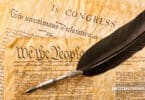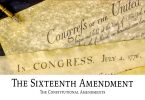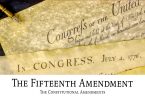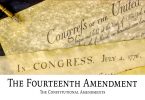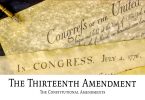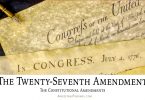The Twenty-Fourth Amendment to the US Constitution bans a poll tax for the privilege of voting. Prior to the adoption of this amendment, there were several states that made potential voters pay a fee, called a poll tax, in order to be allowed to vote. These poll taxes effectively disenfranchised lower-income potential voters. Congress realized this was not a fair or equitable requirement in the states that used it, and that it created an unreasonable barrier to voting to those who would otherwise be qualified to vote. The amendment was proposed by Congress in August of 1962 and adopted to the US Constitution on January 23, 1964.
What Does it Say?
“Section 1. The right of citizens of the United States to vote in any primary or other election for President or Vice President, for electors for President or Vice President, or for Senator or Representative in Congress, shall not be denied or abridged by the United States or any State by reason of failure to pay any poll tax or other tax.
Section 2. The Congress shall have power to enforce this article by appropriate legislation.”
What Does it Mean?
After the Civil War, many of the southern states that had been a part of the Confederacy adopted poll taxes in an attempt to keep African-Americans from voting, since the Fifteenth Amendment kept the states from outright banning people from voting based on their race, ethnicity, or previous status as a slave or indentured servant. The southern states knew that African-Americans within their borders were lower-income people, which made the poll tax an effective deterrent for a lot of them when it came to voting.
A challenge to the poll tax laws in 1937 was rebuffed by the US Supreme Court. In this case, Breedlove vs. Suttles, the Supreme Court ruled that deciding on voter qualifications was something that was up to each individual state, as long as those states were not violating the Fifteenth Amendment (which gave African-Americans the right to vote) or the Nineteenth Amendment (which gave women the right to vote). Because of this Supreme Court ruling, those who were opposed to poll taxes knew it would take a Constitutional amendment to change the poll tax laws.
When the Twenty-Fourth Amendment was adopted to the US Constitution, there were five states that still had poll tax laws—Alabama, Arkansas, Mississippi, Texas, and Virginia. The amendment prohibited the use of poll taxes in federal elections. In 1966, the US Supreme Court ruled that the poll tax could not be used in any level of election, as the Twenty-Fourth Amendment made those taxes unconstitutional across the board.
There have been subsequent litigation regarding the rights of voters, as well as the right to vote since this amendment was adopted to the US Constitution. In most of these cases, the Twenty-Fourth Amendment has been cited as a reason why any kind of voter registration requirement that is potentially discriminatory should be declared unconstitutional.

